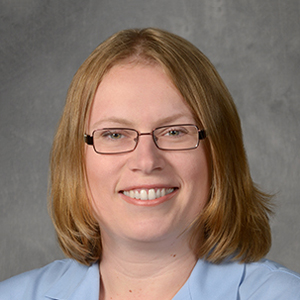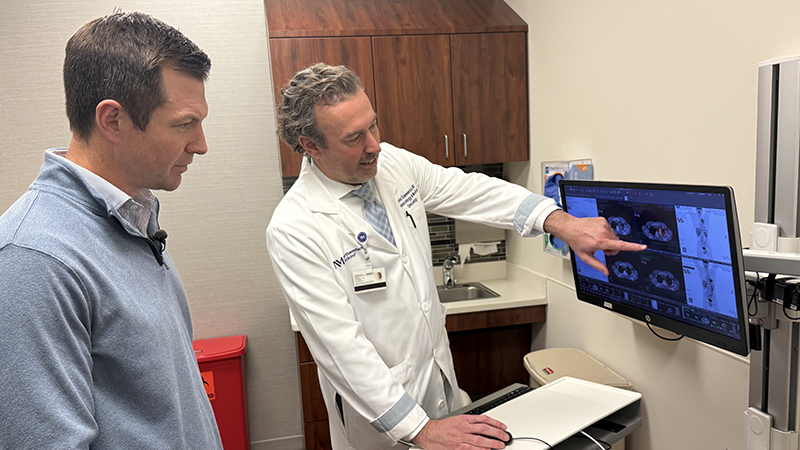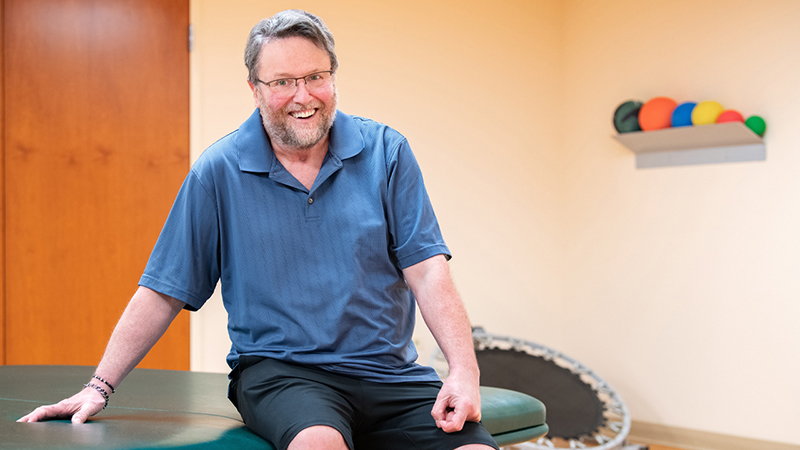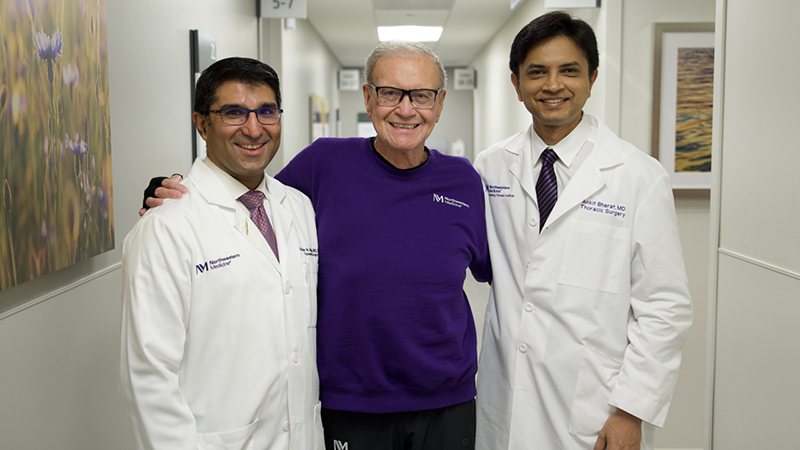Battling Breast Cancer While Pregnant
Rare but Possible Cancer Treatment During Pregnancy
Published December 2021
"I questioned whether or not I could continue with my pregnancy and how it would affect the baby if I could," she says. Christine went through in vitro fertilization for both of her pregnancies. The thought of losing her baby after such an arduous process scared her.
Christine did not have to choose between her life and her baby, thanks to collaborative and comprehensive breast cancer care at Northwestern Medicine.
1 in 3,000
I just want to be there for my family.— Christine Kump
Christine Kump, 34, was eight weeks pregnant when she found out that she had breast cancer.
Pregnancy-associated breast cancer (PABC), or breast cancer diagnosed during pregnancy, is rare: One in 3,000 pregnant people will receive this diagnosis. Fortunately, treatment is possible. In fact, patients can receive some types of chemotherapy starting in the second trimester, after the baby's vital organs form.
Once she met with physicians to discuss her options, Christine was relieved to learn she could continue with the pregnancy while receiving treatment. Although the thought of going through chemotherapy while pregnant is daunting, both Christine and her physician, Dragana Tomic, MD, medical oncologist at Northwestern Medicine Cancer Center in Warrenville, knew it was necessary.
"Opting to not do treatment and letting the cancer grow for nine months during pregnancy will not produce a good outcome," says Dr. Tomic. "Christine was very brave. She is a strong woman and has excellent family support. We were there to support her through her journey."
Treatment Begins
Christine started chemotherapy in February 2021 during her second trimester. Typically, patients receive supportive medications to help with nausea and white blood cell count during chemotherapy. Since those medications cannot be used during pregnancy, Christine had chemotherapy once every three weeks instead of every two weeks; this allowed her body and her white blood cell count more time to recover. In total, she received four treatments of Adriamycin and Cytoxan (AC).
"The first week after chemotherapy treatments, I felt a lot more fatigue and overall didn't feel well," Christine says. "During the second and third weeks, I felt pretty good, so I did have some time to enjoy being pregnant."
After completing the AC chemotherapy, Christine waited three weeks and then began Taxol, a weekly chemotherapy treatment. Two days after her fourth Taxol treatment, her water broke.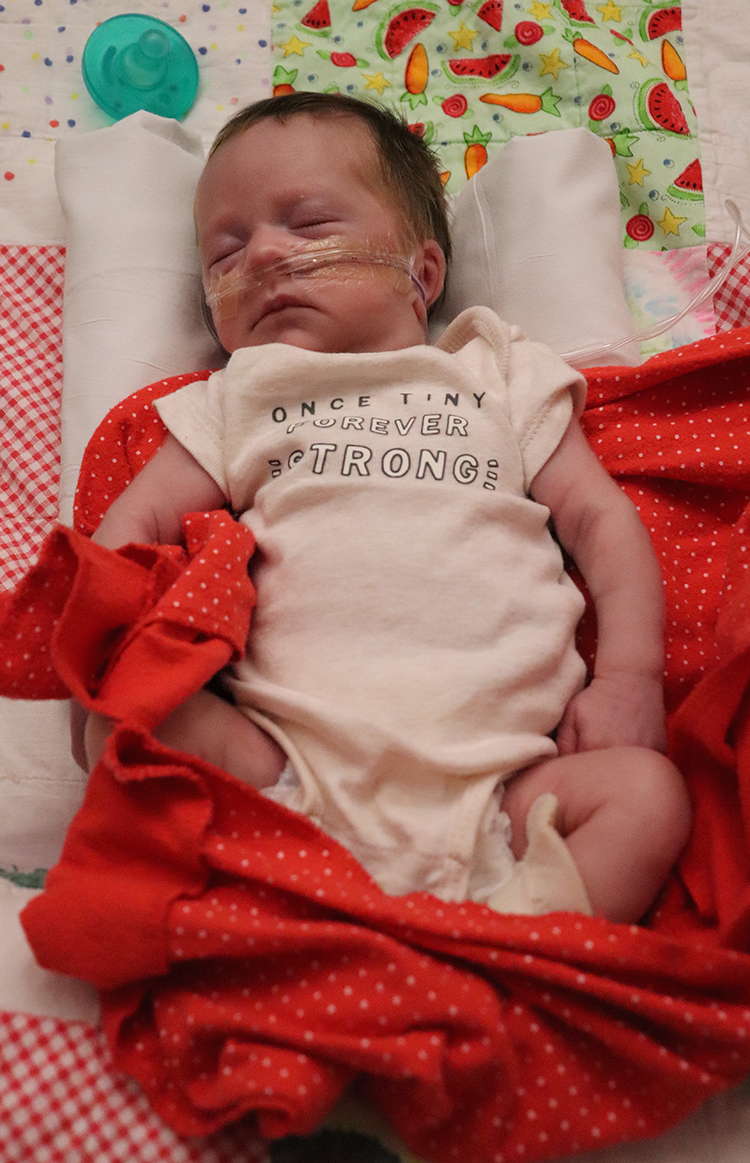
Early Arrival
Christine's pregnancy was only at 29 weeks and one day of gestation when she and her husband Matt welcomed their second daughter, Vivian.
"I always loved the name and then I learned it means 'alive,' and I felt that it was so fitting after she went through chemo with me," Christine says.
Initially, Christine worried that the chemotherapy played a role in Vivian's premature birth, but her care team reassured her that was not the case.
"Vivian had no abnormalities associated with Christine's chemotherapy," says Jeffrey L. Loughead, MD, medical director of Pediatrics at Ann & Robert H. Lurie Children's Hospital of Chicago at Northwestern Medicine Central DuPage Hospital and Northwestern Medicine Delnor Hospital. "Vivian was intubated for about a week to support her immature lungs, provided nutritional support, and treated for jaundice, electrolyte disturbances, apnea and heart changes, which are typical issues for preterm infants."
Born at 2 pounds, 10 ounces, Vivian had a fair amount of growing to do before she could go home. Christine and Matt knew their daughter was in good hands with the Neonatal Intensive Care Unit (NICU) staff at Central DuPage Hospital.
Christine resumed treatment for her breast cancer.
One Foot in Front of the Other
Following her cancer diagnosis, Christine was not able to do a breast MRI, CT scan or a bone scan because the dyes used are not safe for pregnancy. A week after Vivian was born, her oncologist ordered a CT to check on the status of the tumor. The cancer had not spread to other areas of her body and the tumor had gotten smaller, but it was still there.
Christine restarted chemotherapy with Carboplatin, which she could not receive during pregnancy. She continued these treatments once a week for eight weeks with her last dose on August 3, 2021.
"I grew up playing sports and am used to working toward a certain goal. My dad's coaching cue was, 'Just keep putting one foot in front of the other,' and that's what I'm doing every day," she says.
Genetic Testing and a Preventive Surgery
When Christine learned she had breast cancer, she went through genetic testing and tested positive for the BRCA1 gene mutation. People with this mutation carry a much higher risk of developing breast cancer or ovarian cancer. As a preventive measure, Christine chose to have a bilateral mastectomy, which is the surgical removal of both breasts.
She met with Mary Ahn, MD, breast surgeon at Central DuPage Hospital and Delnor Hospital. Since Christine had an active cancer, the primary focus was to treat her cancer first.
"With an active cancer, you have to make sure you're taking care of the cancer properly and the genetic mutation becomes secondary," Dr. Ahn says. "Once you've treated the cancer, we consider the appropriate surgery for reducing risk of a second cancer. When you're a young person, you have a significantly higher risk of second cancer occurring later on."
In the early morning of her 35th birthday, Christine underwent a bilateral mastectomy.
Christine's cancer journey is not yet finished. She will soon begin radiation to destroy any remaining cancer that might be in her body. Through this challenging time, her love for her family is what drives her to push through.
"I just want to be there for my family," she says. "The thought of not being here to see my kids grow up is what keeps me going. I'm going to do everything I can to be there for my girls."



